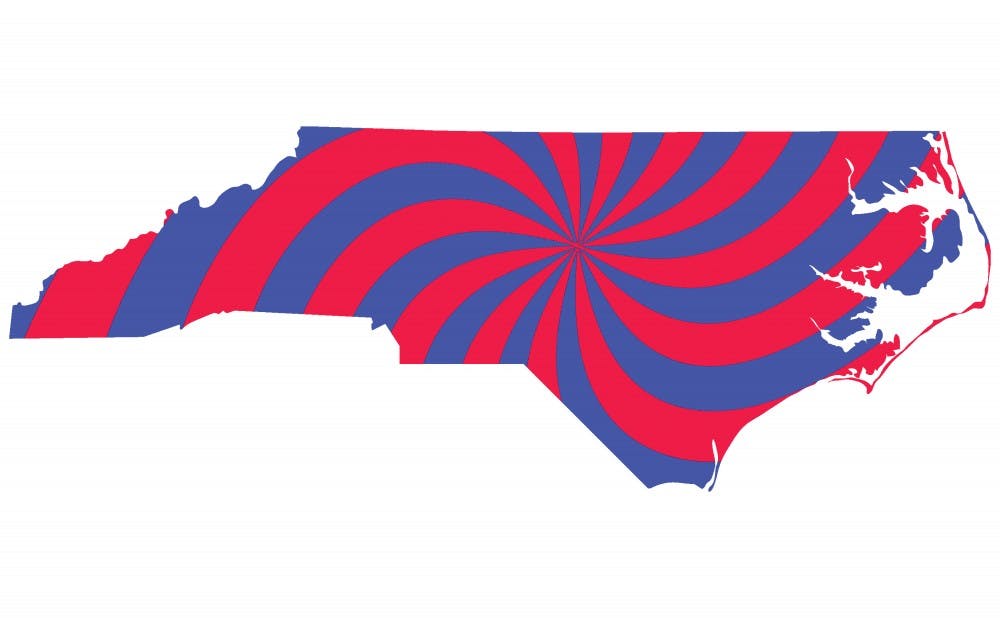For the second time this year, a federal court has ruled that North Carolina’s congressional districts are unconstitutionally gerrymandered.
A three-judge panel of the U.S. District Court for the Middle District of North Carolina has ruled that North Carolina’s congressional districts violate the equal protection clause of the 14th Amendment by unduly favoring Republican voters over Democrats. Although vote totals for Republican and Democratic candidates were roughly equal in recent elections, Republicans currently hold 10 of the state’s 13 seats in the U.S. House of Representatives.
“My concern is that what's happening is...the constitutional political hardball that the Republicans have been playing in the legislature is turning into political constitutional screwball," said Pope McCorkle, professor of the practice in the Sanford School of Public Policy.
In January, the same three-judge panel unanimously found North Carolina’s districts to be unconstitutional. The U.S. Supreme Court sent the case back to the district court in June, asking that it revisit whether the plaintiffs—Common Cause and the League of Women Voters of North Carolina—had proper standing.
In a 2-1 decision Aug. 27, the district court came to the same conclusion as it had in January.
The court’s opinion offered a variety of potential remedies, but did not mandate exactly what must happen in November’s election. Primaries took place in May, and candidates have already began campaigning in their districts. There is no clear sign about what will take place this November.
Republicans have not been shy about their partisan intent in drawing districts. State Representative David Lewis, a Republican, admitted in 2016 that party affiliation was taken into account when drawing the new districts, but race was not.
“I propose that we draw the maps to give a partisan advantage to 10 Republicans and three Democrats because I do not believe it’s possible to draw a map with 11 Republicans and two Democrats,” Lewis said at the time.
In February 2016, the North Carolina General Assembly was forced to redraw the congressional districts after a federal court ruled that they were unconstitutionally racially gerrymandered. After the 2014 midterm election, Republicans controlled 10 seats.
Much of the evidence that demonstrated North Carolina’s extremely gerrymandered districts came from a team of Duke professors and students. Professor of Mathematics Jonathan Mattingly has spearheaded research into quantifying gerrymandering and presented his evidence before the district court.
He—along with faculty, a student writing her senior thesis and students in the Data+ program—has created a distribution of over 24,000 sample district plans. They showed that the districts the GOP drew in 2011 and 2016 were statistical outliers, almost perfectly optimized to guarantee 10 Republican districts.
Some members of Mattingly's team are optimistic that their tools can be used nationwide, as they've already studied congressional districts in Wisconsin, Maryland and Pennsylvania.
"With this case, we have a new methodology at a federal level that could carry the torch on with a method of detecting and combating gerrymandering," said Greg Herschlag, assistant research professor of mathematics and member of the Quantifying Gerrymandering team.
With the ruling, however, there is a potential for chaos come election time.
"There's an open question about what can be done between now and the election,” McCorkle said, calling the timing “extraordinary.”
Judge James Wynn recommended in his 321-page opinion that the districts be redrawn, and that a general election either be held in November without a primary or in January with primaries in November.
McCorkle noted that the court was in a tough spot—having ruled that the districts were unconstitutional, how could it advocate for unconstitutional elections?
Mattingly and Herschlag said they were not sure what would happen, but they speculated that the Supreme Court would stay the lower court’s ruling so that elections are held with the current districts.
"If you take the court's rulings as they stand, we've been without legal maps for every election in this decade," Mattingly said.
Districting questions and elections are supposed to be handled by the legislature, McCorkle said. However, he added that the GOP seems “heckbent” to “try for the most extreme things [they] can do in the short term” and grab as much as power as they can.
He commented that their strategy is politically reckless and sets a dangerous precedent. The Republicans are not setting up a durable governing regime in North Carolina, he argued, by taking such extreme measures and eschewing public committee meetings for important legislation. They’re also forcing the judiciary to become political, since so many of their actions are being taken to court.
"Every explanation is politics, politics and my opponent against me,” McCorkle said of the Republican attitude. “Well, really? Maybe if you had had committee meetings and had subjected yourself and your ideas to criticism… you might have even had a law no court could say is unconstitutional.”
All of the court battles over the past decade do naturally raise a question—how bad is North Carolina’s district map compared to the rest of the country?
“From what we've seen, it's the worst,” Herschlag said.
Get The Chronicle straight to your inbox
Signup for our weekly newsletter. Cancel at any time.

Jake Satisky was the Editor-in-Chief for Volume 115 of The Chronicle.

